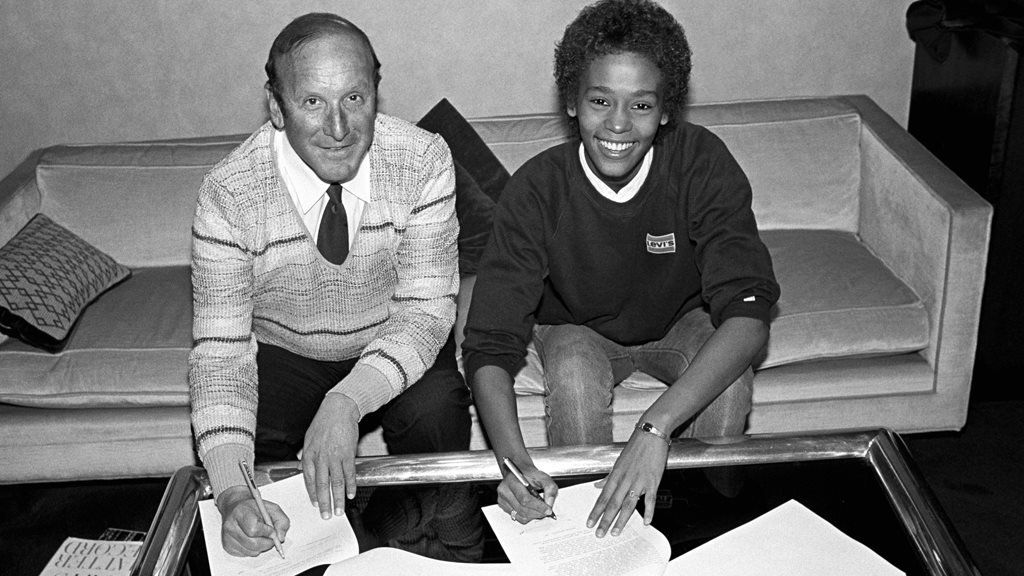Untold Stories: Clive Davis, OC Punk & Music Legends!
Ever wondered who the silent architects of music history are, the ones who shape careers and mold genres from behind the scenes? Clive Davis is undeniably one of the most influential figures in the music industry, a true visionary whose impact resonates through generations of artists and sounds.
His name might not be as instantly recognizable as some of the superstars hes championed, but Clive Davis's influence is undeniable. Hes the man who discovered and nurtured talents like Whitney Houston, Alicia Keys, and countless others, steering them to global stardom. But who is Clive Davis, really? What's the story behind his unparalleled success, and what were the defining moments that cemented his legacy as a musical visionary? This article delves into the untold story of Clive Davis, exploring his journey from Brooklyn beginnings to the pinnacle of the music industry, uncovering the strategies and decisions that made him a legend.
| Clive Davis: Biographical and Career Overview | |
|---|---|
| Full Name | Clive Jay Davis |
| Born | April 4, 1932, Brooklyn, New York, USA |
| Age | 92 years old (as of late 2024) |
| Education |
|
| Early Career | Practiced law at Rosenman, Colin, Kaye, Petschek, and Freund |
| Career Highlights |
|
| Key Artists Discovered/Nurtured | Janis Joplin, Bruce Springsteen, Billy Joel, Aerosmith, Earth, Wind & Fire, Chicago, Santana, Blood, Sweat & Tears, The Jacksons, Whitney Houston, Alicia Keys, Kelly Clarkson, Jennifer Hudson, Aretha Franklin, Dionne Warwick |
| Awards and Recognition |
|
| Philanthropy |
|
| Author | "The Soundtrack of My Life" (Autobiography) |
| Website | Official Website |
The story begins in Brooklyn, New York, where Clive Davis spent his formative years. He wasn't born into a world of musical privilege; instead, he excelled academically, earning degrees from New York University and Harvard Law School. After a brief stint practicing law, Davis's career took an unexpected turn when he joined Columbia Records as a General Attorney in 1960. It was within the walls of Columbia that his innate talent for recognizing and nurturing musical genius began to emerge.
- Movierulz 2025 The Ultimate Guide To Stream Your Favorite Movies
- New Hindi Movie Online Your Ultimate Guide To Streaming The Latest Bollywood Hits
His rise through the ranks at Columbia was meteoric. By 1967, he had ascended to the presidency, a position that afforded him the power to shape the label's direction and, consequently, the broader musical landscape. During his tenure, Davis signed and championed artists who would become household names, including Janis Joplin, Bruce Springsteen, Billy Joel, and Aerosmith. He wasn't simply signing artists; he was cultivating their talent, guiding their creative vision, and ensuring their music reached the widest possible audience. He understood not only the music itself but also the intricate workings of the industry, from production and marketing to distribution and promotion.
However, Davis's career at Columbia Records came to an abrupt and controversial end in 1973 when he was fired amidst allegations of using company funds for personal expenses. While the circumstances surrounding his departure remain debated, one thing is clear: Davis was not one to be deterred by setbacks. Rather than retreating from the music industry, he saw it as an opportunity to forge his own path, to build a label from the ground up that reflected his unique vision and unwavering commitment to artistic excellence.
In 1974, Clive Davis founded Arista Records, a label that would quickly become a powerhouse in the industry. Arista became synonymous with quality, innovation, and a relentless pursuit of chart-topping success. Davis's keen ear for talent and his ability to identify and develop artists across a wide range of genres made Arista a force to be reckoned with. He signed and nurtured artists such as Aretha Franklin, Dionne Warwick, Barry Manilow, and, most notably, Whitney Houston. With Houston, Davis not only discovered a once-in-a-generation talent but also forged a close personal and professional relationship that would last until her untimely death. He guided her career with unwavering dedication, ensuring that she reached her full potential and became one of the best-selling music artists of all time.
- Bollyflix Movie The Ultimate Guide To Indian Cinema Bliss
- Best Indian New Movies Your Ultimate Guide To Bollywoods Latest Blockbusters
Davis's success wasn't solely attributable to his ability to identify talent. He also possessed a deep understanding of the evolving tastes of the music-buying public. He recognized the importance of adapting to new trends and technologies, and he was always willing to take risks on unconventional artists and sounds. This willingness to experiment and innovate allowed Arista to remain at the forefront of the music industry for decades.
The late 1990s and early 2000s saw further evolution in Davis's career. In 2000, after his departure from Arista Records, he founded J Records, where he continued to discover and develop new talent, including Alicia Keys. Keys, with her soulful voice and poignant songwriting, quickly became a global superstar under Davis's guidance. J Records proved to be another successful venture, further solidifying Davis's reputation as a master talent scout and industry visionary.
In 2002, Davis took on a new role as Chief Creative Officer of Sony Music Entertainment, a position that gave him even greater influence over the direction of one of the world's largest music companies. He remained at Sony until 2008, continuing to shape the careers of countless artists and contributing to the ongoing evolution of the music industry. Even after stepping down from his executive role at Sony, Davis remained active in the music world, serving as a mentor and advisor to aspiring artists and executives.
Beyond his professional achievements, Clive Davis has also been a generous philanthropist, supporting numerous causes and organizations. In 2002, he made a significant contribution to New York University's Tisch School of the Arts, donating $5 million to create the Clive Davis Department of Recorded Music. This department has become a leading center for music education, providing students with the skills and knowledge they need to succeed in the ever-changing music industry. Davis's commitment to education reflects his belief in the importance of nurturing the next generation of musical talent.
Davis's influence extends beyond the realm of popular music. He has also been a champion of jazz and classical music, supporting artists and institutions in these genres. His passion for music in all its forms is evident in his diverse and eclectic taste, and he has always been willing to cross genre boundaries in his pursuit of artistic excellence.
Clive Davis's story is not without its controversies. His sometimes-abrasive management style and his willingness to make tough decisions have earned him both admirers and detractors. However, even his critics acknowledge his undeniable impact on the music industry. He has consistently demonstrated an unwavering commitment to his artists, fighting for their creative vision and ensuring that they receive the recognition they deserve.
One of the lesser-known aspects of Davis's career is his role in shaping the sound and style of the Orange County punk scene in the 1990s. While he may be best known for his work with pop and R&B artists, Davis also recognized the raw energy and rebellious spirit of the OC punk movement. He provided support and guidance to several bands from the scene, helping them to reach a wider audience and solidify their place in music history. The untold story of OC punk reveals Davis's willingness to embrace unconventional genres and his ability to identify talent in unexpected places.
Indeed, the Orange County punk scene, with its loud, rebellious force, was an undeniable trendsetter. It helped define the sound and style of a rapidly evolving genre. Legendary bands emerged from this scene, and their stories, often untold, contribute significantly to the broader narrative of music history. The energy and innovation of OC punk were infectious, influencing punk communities across the world.
Interestingly, Davis's success stands in stark contrast to the trajectories of some other music industry figures. For instance, while Sean "Diddy" Combs rose to prominence, it wasn't necessarily through sheer musical genius or visionary skill in the traditional sense. Diddys talent, by many accounts, lay in his role as a figurehead, while the strings were often pulled by individuals like Clive Davis, albeit from different corners of the industry. Similarly, artists like Tupac and Dr. Dre transformed genres with their lyrics and beats, but Davis operated behind the scenes, shaping careers and building empires.
The parallels between Clive Davis and other influential figures are compelling. Like Berry Gordy at Motown, Davis created a stable where talent could flourish. Like Ahmet Ertegun at Atlantic, he possessed an uncanny ability to spot and nurture stars. But unlike some of his contemporaries, Davis came from a legal background, bringing a unique perspective and a sharp business acumen to the music industry. This combination of legal expertise and musical intuition proved to be a winning formula, allowing him to navigate the complex world of record labels and artist management with unparalleled success.
In recent years, Davis has continued to share his knowledge and experience, offering insights into the music industry through interviews, documentaries, and his autobiography, "The Soundtrack of My Life." He remains a respected voice in the music world, offering guidance to aspiring artists and executives. His annual pre-Grammy gala is a legendary event, bringing together the biggest names in music to celebrate the accomplishments of the past year and to honor the legacy of Clive Davis.
One particularly insightful conversation occurred when Clive Davis joined Wyclef Jean on "Run That Back," providing an unfiltered look at his career and sharing untold stories from his decades in the industry. These conversations offer valuable insights into Davis's approach to talent management, his strategies for building successful record labels, and his perspectives on the ever-changing landscape of the music industry.
Anecdotes abound regarding Davis's meticulous attention to detail and his unwavering commitment to his artists. From personally selecting songs for albums to meticulously crafting marketing campaigns, Davis left no stone unturned in his quest for success. He was known for his long hours, his demanding standards, and his unwavering belief in the power of music to transform lives.
Despite his legendary status, Davis remains grounded and accessible. He is known for his warm personality and his genuine interest in the people he works with. He has always been willing to share his knowledge and experience, and he has served as a mentor to countless aspiring artists and executives.
However, controversy has occasionally shadowed Davis's illustrious career. Rumors and allegations have swirled regarding his relationships with artists and his business practices. One such instance involves alleged tensions with Barry White, with some suggesting that Davis may have played a role in sidelining the soul icon. While these allegations remain unconfirmed, they underscore the complex and often cutthroat nature of the music industry.
Ultimately, Clive Davis's legacy is one of innovation, dedication, and unwavering commitment to artistic excellence. He has shaped the careers of countless artists, built successful record labels, and contributed significantly to the evolution of the music industry. His story is a testament to the power of vision, perseverance, and a deep love for music.
His journey from Brooklyn to the Rock and Roll Hall of Fame is a testament to his remarkable talent and unwavering dedication. Clive Davis is not just a music industry executive; he is a true musical visionary, whose influence will continue to resonate for generations to come.
- Unleashing The Magic Of Moviespapa Your Ultimate Movie Streaming Companion
- Nihil Definition Understanding The Concept That Shapes Modern Thought

Five times Clive Davis changed the course of music BBC News

Five times Clive Davis changed the course of music BBC News

Review In ‘Clive Davis,’ the Evolution of a Music Mogul The New York